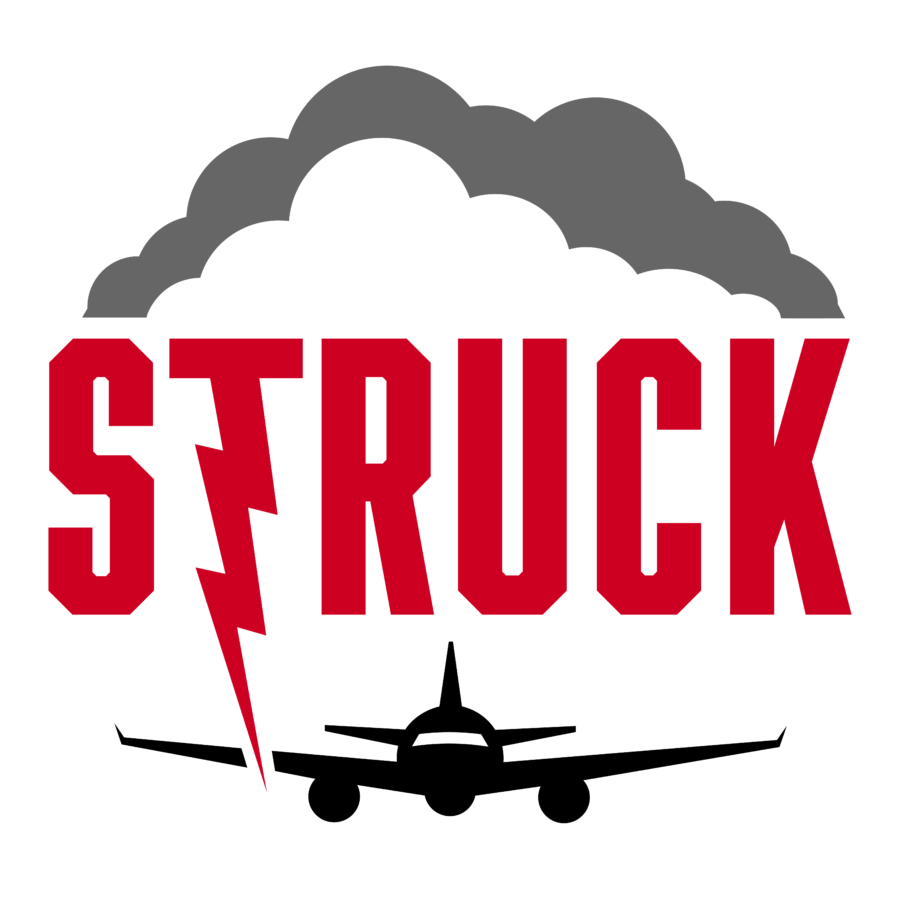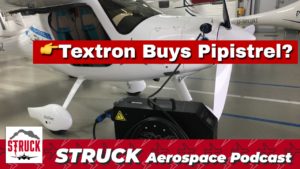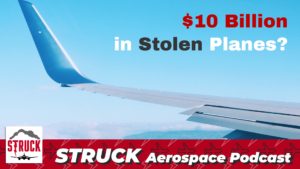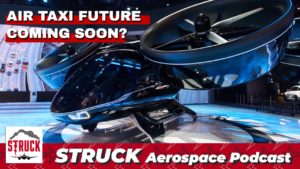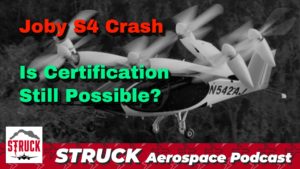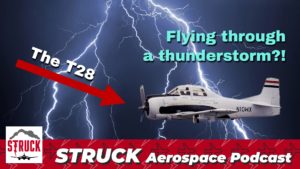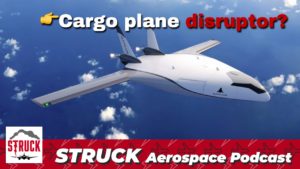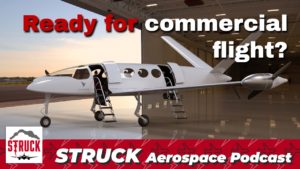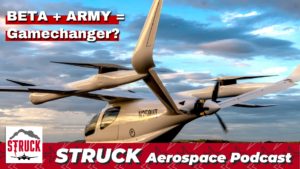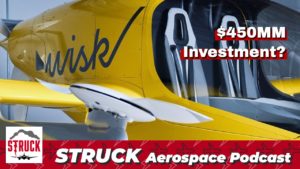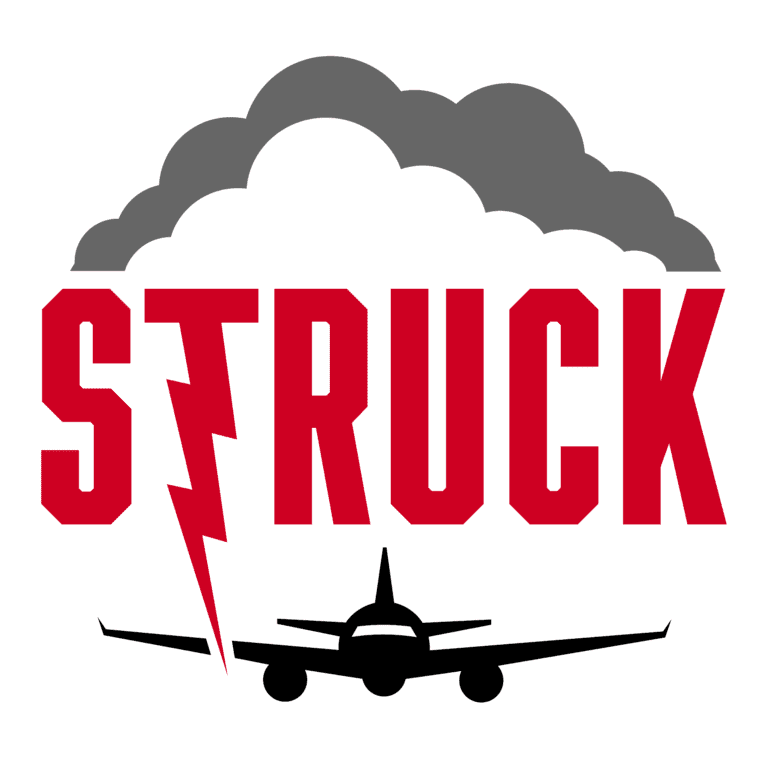Podcast: Play in new window | Download
Hector Del Aguila is an expert in EMI, Lightning Protection and HIRF, and also serves as a DER (designated engineering representative) for the FAA. In this episode of the Struck Podcast, he shares wisdom from his career as a researcher, his time with Eclipse Aircraft, and how his work on military aircraft helped shape his private sector work in the aviation industry. Hector is also an EME specialist, providing consulting services to numerous government contractors and organizations.
Hector is the president of Golden Aero Consulting and we are very grateful to have him on the show. Watch the YouTube video version of this podcast episode here: https://youtu.be/30kqC-6uwtg
Learn more about Weather Guard StrikeTape segmented lightning diverter strips. Follow the show on YouTube, Twitter, Linkedin and visit us on the web. Have a question we can answer on the show? Email us!
Show Transcript – Struck Podcast EP8 with Hector Del Aguila, FAA DER
And as part of that education, your focus, and at the time you weren’t, were you thinking about being, we’re working in the aircraft industry or were you just electromagnetics and you just like the math?
I always have a desire to, to work in our space and, and I think we’re on an aircraft. And, for personal reasons because of, my mother died on the, blank crush, when I was, seven or eight years old and, and soil was thought about, when I became, when I was studying engineering.
That’s something that the, that it peaked my interest. And I decided to move, to do research on things to do, to protect, Not on the aircraft, but then like electrical and electronic systems in general
and your stuff, like you’re originally from Korea.
Yeah. I was wondering through, yeah,
you say it better than I do.
It’s such an
awesome, yeah. I came here, you know, in my early twenties and yeah. And, at the study and then that’s it.
So after, after you had your, you guys’ degree in Texas, you went, where was your next step? Where did you go?
Oh, yeah. Well, after I got the degree at Texas, while I was working on my graduate, degree, I taught in the university.
I thought about the metrics and, and I engineered laboratories about that point a couple of years. Well, I’ll say a graduate assistant. And they, after that, I moved to Albuquerque to a, an organization called LaFollette. That’s the air force operational test and evaluation center, as an RF engineer.
Not familiar with that place. What did they do? What do they
call that place at that organization? in New Mexico, they do operational testing of, of systems, and, aerospace systems and these stairs, in, in that particular time, it was some satellites and telecommunication systems is what I thought.
And ?
No. Well, what kind of airplanes were you working on at the time?
Well, I thought at that time he was, at that time was not airplanes at the time. It was mostly, telecommunication systems. gotcha. Satellites, satellite, things like that. For example, there was a, there was a system called middle star.
I’ll try service.
So after about three years of being on the operational world, I realized that that’s not really what my main interest was. So, because I wanted to do some reasons to do research, and after three years, I moved from to. so the air force research laboratory worked there for about 20 years doing research, again, looking at protection of electrical systems, things like that from, from the electromagnetic standpoint.
So, as, as, I mean, doing research over a 20 year span has gotta be pretty incredible to see. A lot of the technology change, just I’m sure the, the resources you had, you know, in just the systems and you, and you could test and I’ll just like the different, you know, the technology and, and software I’m sure use it.
How did, how did research change for you over such a long period of time? Well, it, it was, it was very nice because we were able to, to the science systems from the ground up. And, and also assess the, you know, I said it’s not only be a performance of the system that will be in bill, why the impact of, water Susan May have on the electrical and electronic systems in general.
And in this case, you know, probably it’s, aircraft, military aircraft and these guys, and things like that. Yeah, he was, he was a very, it was a wonderful learning experience in, in a group thing, a good place to be. that’s fine. I swapped my, my calls were thankful that as much as we could, and in applications of electromagnetic, they were even through the real world.
And, and so, but after about 18 years. you know, as you progress, you progress through the ranks. I was a civilian, I was not in the military. It was a CB, the engineering work engineer working for, or the military and, and so as you progress on rank and stuff like that, unless you meet inside the, what happens is the things you can face you off from the actual technical work on the management side.
And that’s when I decided to go somewhere else because I didn’t want to do that. And so after about 18 years, I left in, I decided to join the, private industry at that, at that time, there was a, on this startup company, you know, curfew, that was making big waves throughout the, aviation industry, particularly the smaller.
Yeah. And that wasn’t, that was, that was a Eclipse, right?
The company was Eclipse
and Eclipse was a, essentially a startup. If you think of an aircraft
company was in the ground up. Right?
So they had no history. Yeah. They have no history before it was, they had started where they were funded by, outside basically Silicon Valley, Seattle monies, to, to form the thing.
And, and what, what, what was the revolutionary thing to bring to the table?
Microsoft, eclipse us smile by stone, not by our microbiomes. It’s Microsoft. one of the, I guess he was one of the founders or close to it. Microsoft, Ray rate. Huh. Okay. But anyway,
are you talking about Fern
Rayburn?
Burbank. Yeah. He was part of Microsoft, right? That’s what I saying. Yeah. Yeah. Stuff like that. So that was an eye opener for me when I went to work from the department of defense from our column and organization too. To a, to a commercial institution, especially a startup company. I didn’t realize, you know, realize the, you know what I’m, I was getting into what that’s all like this.
And, although to me seem that, you know, because of what the needs were, he was right on the area that I did a little research on it and I knew be could be a good vehicle health to them. however, I didn’t know much about the regulatory aspects of it. Yeah. And that, that was the eye opener for me.
And then, that’s as far as what, Oh, a company like these has to go through. Do we have to be able to certify on that report?
What’d they, what’d they tell you when, when they hired you, when they brought you here, they brought you in, or you knew somebody that was working there and they, they said, Hey Hector, we got this new startup.
we’ve got, funding to build this airplane. What do they, what do they tell you when you walked across the street there to check this place out?
But somehow they got my name. From someone I don’t remember at that point then, and I got a call out of the blue from a recruitment person that this particular organization, and they asked me if I was seen through state and, know if I was to, you know, to send in my resume and so forth.
So, and then I did. Yeah. Yeah. And within a week or so, if I remember correctly, on a week or two, I got a phone call and I said, you know, we would like to talk to you and do you mind coming over and spending a few hours with us? Wow. A few hours ended up being the whole day because I interviewed with everybody, falls at departments, not only with the elect, with the electrical, system department, but also with the mechanical guys and everybody else.
And it was an interesting, He was an interesting, set of, circumstances and, and, and, asked her about, you know, going through the interview throughout the day with different people. you know, some that they realized that I knew what the, they realized that I knew what my expertise, you know, that what I was, I was, what’s the word I’m looking for?
Oh, you’re clearly the expert.
I knew the area and how it applies on aircraft and so forth. I saw because of my experience on military aircraft and so forth, so when I’m doing protection. On those aircraft from the electromagnetic standpoint and
from their perspective to Hector. I think that they were looking, they did not from my outside, look at that program.
They were looking for the smartest people they could find, not
necessarily people who had a lot of, Oh yeah. As a matter of fact, the fact that, I realized once I joined the team that that team was just awesome. I learned a lot from them. I bought aircraft in general about the sign, their is size, the details so that, it was saw something and yeah, that this company, when it, I’ve recruited the best that they could find and industry and the salaries were great, but the amount of work was also great.
Did they offer you a stock as part of that to it across?
Yeah. That was, that was one of the enticing things, apart of the service being, you know, a good salaries and, more than a small fact, the, that particular company and Intel, silicone here in, and there is a plant, in topline here.
There were the two, the two, companies that will pay the most engineering wise. And. And so, yeah, the, in order to recruit the people they wanted to recruit, they had to offer that. And in addition to having good salaries, the, they will offer you a stocks on the company and they send that, which gives you an incentive to, you know, to continue to work and stuff like that.
And if that company successful, then everybody. Benefits from that. So is there a pressure, Hector, that you felt with that like with right, I now have a, you know, a piece of this company essentially. do you feel like that’s almost like them getting you to buy in more so that you feel like you have to work those extra long hours, that you really can’t go home on a normal nine to five time?
Not that that was their intention, but did you feel an extra pressure added on to having equity in the company? well, not so much the pressure, but our best interest, I guess I should say it. And then. and yeah, you, you know, obviously working for a company like that, like I said, he was an eye opener because I didn’t realize how long hours you have to work because they all work well, very tight, tight schedules, certified on the aircraft from the ground up is very difficult, especially if you’ve never done it.
And these, in this case, this company, that was the first StarCraft. They were, there was the signing. It’s not like they had a, you know, they had a, I experienced on doing that. So that’s the reason they were hiring people that had experience, not on the, on the certification side, but also on the engineering side.
I have to make sure that things go without, at least. Right. And engineering wise, of course, we, they were good at pretty good engineers and also engineers. And they would assign things and then like every now and then, the people that were more knowledgeable that, that certification aspects of it, you know, they will.
Guide us about, you know, what things could be done, what couldn’t be done. Although the design could be the best design that you can, that you can produce. You know, at the end, you may not be able to certify. Right? So all of that, come seem to play.
And, and that, that the thing about that airplane actor, I think that just so everybody gets some background on it, cause it’s you and I of what you lived at more than I did, but we both run that program a little bit.
was that airplane was like the first light
jet.
Right,
like a production sense, and they, it was going to have Williams engines on it and the Williams engines were sort of prototype engines had to come from another industry into, and that was in fact, Williams had actually started, the program was not that originally when that started was Williams had started the program, then it moved to Albuquerque and
bigger than Williams.
Right? I believe, I can’t remember exactly, but I believe they started somewhere.
What’s your Michigan
you meet, you got, I believe,
I think there were Michigan when I first remember talking to them and then they moved to Albuquerque cause it’s a lot warmer and it’s, it’s beautiful. And Albert, right? but the, the, the key to that airplane was if it’s going to be a low cost, very efficient, like an air taxi situation.
And it, because of the. Computational power and the knowhow from the engineers that have come from Silicon Valley is going to be very easy to fly. In fact, that our plane had its own, flight control computer that they, they designed a Navy optics system, which they were designing their own avionics systems and,
but it
didn’t end up, it didn’t end up that way.
Right. They were trying to make their own avionics systems at one point.
Right. Right. If they ended up outsourcing some of that, but one of the themes that eclipse did is they, they, they, they were the ones that developed the, the software, that basically communicates with all these systems and stuff like that.
And, and,
that was windows based, right? That was a windows based
software
integration system. But remember, right
now, I’m not. Exactly. But you may be right. And I don’t recall. It’s been a while. But anyway, the, the software guys were what? Amazing. And yeah. And it, everybody, all, everybody, you know, it was a very.
That the people, the everybody had a goal in mind and, you know, and, and, and, and he was also to see that dedication that they, everybody put in, you know, from the management side all the way down to, to the, to the technician side from the, you know, I’m in the men inside them, even the human resources people.
it was an awesome company to work with.
Well, you want the first places that I remember going to where the word on the street was. It was like Silicon Valley and that, that you had a free soda machines and snack area. Then all, all the accoutrements that come with that and
right then and typically, yeah, they would, that they will give you, so everything was pretty much free there.
Yeah, that’s fine. The idea was, I guess to try to get. Good people to do, you know, to minimize people going out or something like that, to do that, so that you could spend more time within the, you know, within the, the, the facility, the working and stuff like that. And, and that was, and as the time progress, when you get close to certification, it was awesome.
Everybody, everybody including, including human resources, Everybody was like, they’ll work very, very hard, long hours. And they, they used to feed us. They, you know. Bringing all these nice lunches and dinners and things like that so people know at the end, I have even rented cocktails around the area so people can have to go see if they live too far.
Oh, I remember that. That’s right. I do remember that there was a hotel down the street. You didn’t have to go home.
Right, right, right.
Well, you came, you came into that program. At what point? Cause they had done a first flight. Did you come in just after first flight when they’re going to the Pratt and Whitney
engines?
Yes. I came when, when like, yeah, when the president, when the engine started to, they decided to replace the, the, the Williams
engines
that were, came here. that’s when I jumped in. And they, then, when I was there, they didn’t have the expertise on the electromagnetic area. You know, they, they hired, LTI to.
A, they were not consultants in the lighting side,
right? Talking about lighting technologies. I was working at lady technologies. That’s how I met her at
that time. Right. Then that’s when I made sure that I believe in you and the plumber and, and anyway, the, but they, they lack the expertise on the EMI side.
Electromagnetic interfere in the stand. And particularly on the high density Riley fields area.
That’s true.
Which was, which is something that I did what I did when I worked in the department of defense, but are at a much higher, higher levels than what firms is all about. So in, and, he was an eye opener for them, you know, to realize that they had to do certain things to be able to, to meet some of, some of the standards.
Well, they came in at a very weird time. You happened to come in at a, you came into, I always felt like you came in at a very stressful time because he had done first, and if I remember correctly, he had done first flight they had, they had one flight
and
that was it. One flight and it was, they couldn’t, they, the Williams engineers were struggling.
They had difficulty starting them. If I remember right. And then the decision was made, we’re going to remove Williams, we’re going to get Pratt, and when any in here, and Pratt and Whitney has to develop a brand new engine. It wasn’t like there was something off the shelf. They had to go out and create engines specific for this aircraft.
And you came in in the middle of that. And so there’s now there’s chaos going on in the engineering and there’s, they’re concerned about funding. How long is this going to last and which is going to raise the price of the aircraft because Pratt and Whitney is, was a lot more expensive. Right? And so you come out of the air force.
I know very S and a steady job, and he had climbed a ladder because you did, I mean, you’re clearly a very bright person and you, you, you come over to eclipse at a very stressful time, in my opinion. And, and then you also walk into a situation where they don’t have a lot of expertise in the area that you’re supposed to go get certified.
How stressful was that? I mean, that had to be off the charts stressful.
What to do, you know, to choose to put it simply. I think typically I was the one in charge of making sure from the electromagnetic standpoint the aircraft was being designed. To do with the stand and to meet all the regulatory requirements and at that point, so I had to learn as I was going along and, make sure that, that the sign was star Wars, that meeting those calls.
Right. Cause you, you
hadn’t worked in the FAA world at all at that point. You didn’t know military standard stuff for the most part. Right. And
so the rules
and all that were new still.
Yeah, the rules were new. but the processes in the area that I knew, and I worked, it’s DMC or fantasy world, were pretty similar because it’s a district.
Yeah. You know, you have military standards, like, you know, things like that, which are aircraft related. Yeah. and then you go and do the commercial side. Of course. it’s, it’s, you know, it’s, it’s mean, it’s something more stringent, I believe they might be.
I
would agree. I would agree with you there. Right. So, and, and so I, I was very confident on the, on the engineering side, but like I said, I had to learn the regulatory aspects of it.
And, and, and so I have to work long, long hours, You know, especially the first six months or so, once I started to become a bit more familiar with that, you know, what, we, they had to deal not only from the sinus standpoint, but also kind of to meet the regulatory aspects of it. And luckily, in my case, after about a year or so, I was, the, the, about a year, year and a half or so, the, the FAA certification office came to visit, the company to see the progress. And one of the areas that they were, they were interested in, in, in learning on owl, we were doing was on the, electromagnetic compatibility side. And so I had to prepare, and I, since I was the lead for the entire company.
For that area. I have to prepare and like listen patient, so forth. So, so I went and you know, this one possibly was my first direct app, got contact face to face with the, Fort ward, ACU management and engineering side. And I was lucky that, they liked. you know, they liked, what I didn’t know what I presented and, and, you know, they, because after the meeting, the, the head of the, the lead, the office of the, electrical system side, on the FAA, after the meeting, he came and talked to me one-on-one.
And, and he mentioned to me that, you know, that he was pleased that, it keeps up somebody like me there. And, and, at that point he asked me if I would be interested in becoming at the ER. That’s the designated engineer representative,
right. From the FAA, right. To approve designs or recommend approved designs.
Right.
And so. You know, I was, I was surprised, but you know, by the group perception and, and I told them that I would consider it, because there are, you know, there are, how’s that? The, we have awesome responsibilities. I mean, yeah. You know, because you are proving things right. And, and after, I guess after he talked to me, he talked to the head of certification.
By that time. And, and, and I was approach to. If I really wanted some, the company side become a company they are, and that there’s some thoughts. Okay, we’ll get it. And
so did they, did they tell you, did they tell you that? I remember the certification engineer at the time, and I remember when that was all going on.
And, and, Yeah, there it is, Randy. Right. And, my recollection on that, and of course it’s, you know, over time thoughts about it changed, but it was, it was, you were an innocent bystander in that, in my opinion, like you are very knowledgeable person. You knew the material, but I’m not sure they explained to you that position that was going to put you in what, so you’re between the FAA.
And the management of the company, you’re between those two and you’ll
get, you’re like the bad guy.
Yeah. There’s no way you’re going to win in that situation. Right. and, and I remember those, I remember seeing other exciting new, a bunch of the guys at eclipse or engineers at the eclipse and Warner hall guys, that it.
It’s stressful. It was very stressful time and an Hector had to be in the middle of it. And maybe Hector. So you, you lived it. What, what kind of pressure was on ya?
Well, it’s, it is, it’s just, it’s, it’s just, the pressure is just amazing because I mean. You know, it’s very stressful that that whole thing was way too stressful.
You know, because you’re working for a company and you have something signing mine and decent now, but at the same time, you’re representing VFA and, and so you have to, you have to, to, you know, to, put the respective paths whenever you’re doing something right. And then sometimes, you know, because you have, anybody wants to certify, then everybody wants to do that.
You know, my management would push and then of course, you know, and things like that, but there are certain, there’s certain boundaries that they cannot pass right then even even as an employee. And they knew it then of course, they really, they were respectful of that. And, and you know, sometime from time to time, you know, things got, if it heated and so forth and so on, I have to remind them, I have to remind them, you know.
Yeah. Do you know who you’re talking to? You’re talking to the FAA?
Well, yeah. Well, you don’t, you don’t ever, you don’t say it like that, but you do essentially say like, there have been times in my career when I’ve had to say. This has gone beyond the boundaries of where acceptable is, we can’t, you’re putting, you’re putting a lot of pressure on me to sign something which I can’t approve and here’s why I can’t approve.
It doesn’t like, I just don’t feel like it. Like, here’s, here’s the regulation. Your design doesn’t meet that and we can have a discussion about how you can meet it, but either it does or it doesn’t. It’s kind of a go, no, go.
Right. But, but that good thing, you know, to be fair, you know, they would understand that and you know, they would push, but you know, they, but, but you had
built relationships with these, you had built relationships.
I think about eclipse, I thought was interesting, unlike some bigger airplane companies, like they were your friends there. Oh yeah. Right. So you’re telling your friend, you’re telling your friend, you’ve spent a lot of time together, you’ve eaten pizza in the hanger, and you go out and drink on the weekends and whatever, and then all of a sudden you’re tone.
This is front of yours. No, we’re not doing this. And the person that’s paying you on top of it. Right, right, right. What does that feel like when that happens?
Well, like I said, this is stressful, right? And because you try to, the thing is, You got to make sure that you know, that the, whatever hat’s your wedding at a time, you know, that you, you, you explain to them why certain themes couldn’t fly and these and that, and then, yeah.
They will ask you for ways to, you know, how to go and expedite things or something, which is fair. Right. That’s fair. That’s totally fair. Right. And, and, and then you will look at, vehicles and stuff like that, that, that, that maybe the sign changes the calc a little bit and maybe easier to implement things like that.
Right. But the bottom line is, you know, because you were recommending approval at that time, or. Things like that. I’m not from the conflict. It’s not boring. You gotta make sure that, you know, that, that everything that was being done was, what’s going to be, acceptable to the FAA and to yourself as a, as a representative.
Right? And.
So you’re having these, you have these conversations in, in, in meetings, and you’re getting drawn into meetings you probably don’t want to be at. And
there’s
confrontations that are happening, and this is not necessarily always a civil discourse isn’t like we’re having these top level engineering.
It’s not an equal one for your doctoral thesis. This is, Hey, there’s hundreds of millions dollars in this program. You’re stopping it from completion. Explain yourself right. And would you like to, you know, be working for burger King tomorrow?
cause you’re in a very unique position because you gave up a very lucrative career path to come over to eclipse to begin with.
It was a very secure thing, right? Stuff like that. I could stay there and retire, but.
But at the same time, I was looking for something more challenging. Sure. Right. And
what did your wife say when you came home? My wife says, when she come home from those, those were rough days. I mean, what is she saying to you? Like, well, forget it, you know, or no bear through it or.
No. Luckily, you know, my wife was very supportive at that time.
You know, she’s sharing that way. She put it, she put it Western, are you crazy? Have you lost your mind?
And then I said, you know, I want to do this. I want to do that. Then that then to find, I said, okay, that’s your decision. And I was, you know, I’ll walk you up to, and that was the end of it. Then after that. You know what, when she sold me the first few months, that when I started working on this company, this new company, she realized I was stressed out as I was.
And throughout, throughout the entire time that I was there, you know, there were times that were a little bit, you know, not as stressful, but. But the, that majority of time is, especially towards the end when, when you get the certification date, and especially when you, especially Alan, when you have an issue that goes to you, you came find a way of, you know, get it.
Wait to fix it. Stuff like that.
And you had kids in school too, isn’t like it. It’s just that you and your wife, you had kids in school, so you know, you gotta you, you need this job. This job has got to happen.
Right. I quit. Quit right then. And besides that, you know, to be honest with you, I really liked it.
The pressure was there five, you know, all that. But the people was amazing. Yeah. Ian thought that was amazing and I made so many friends, you know, to this date. Yeah, yeah. But I still communicate and
it’s a small world. Did you realize it’s a small world that you see the same type of, or the same people go from program to program program.
So you got to work at eclipse and then later on you see them on another program and it’s just, it’s, it’s just a small community
right. Right? If you were advising a young engineer just graduated and he’s entering, you know, the real world, would you advise him to take a multitude of paths like you did or maybe take, you know, the, the private sector or the startup sector, or, you know, in the military?
Like what, how would you, as you look back on your career as an engineer, what, what advice would you give to a, a starting youngster? Well, they are, they are two different worlds. Right? And, I, I believe that, you know, the private sector, often, offers, you know, at the time anyway, financially, the private sector was better than the government side. But my interest at that time was to work for the government. So I made that my mind that I want to prepare those things. And, and, but as a young engineer, you know, I would, Suggest to them to think it through. You know, what they really want to do and what is her focus that they want to write, but the focus that they want, that they want to put in, do they want to get in to have research type of environment? Or if they not, if they don’t know it, what they will their net, as they go through.
Right. And, Sorry. Can you get stuck on a track like that you can’t get off of, like if you chose research really early? No, that the one, you know, the good thing about the engineering fields is that there is, there is a, you know, that is a, you have paths and you know, in both worlds, and you, you grow in both worlds and nowadays, for example, and then maybe they decide they have to, they have to catch up with the private sector.
Because they were losing too many engineers. Good engineers. Right. Especially on that research area, research area. you know, because of that, those engineers are sought after by private industry like crazy. You know, it’s basically if you have some reputation, they hear from you that you get phone calls and they entice you and stuff like that.
Well, the government trains great employees too, because you have, you just get the experience that you’re not going to get in private industry. You just have that broader breadth of knowledge that you just don’t get an insight on aircraft company. You’re not going to get the experience you had. No way.
And you can apply it there. You can apply your, your, you learn on the garment side, on the private side. But at that time, for example, because, the corpsman was with the, you know, like I said, especially in that research Indian side, they were losing too many engineering nears to private industry because of the different student, in, Well, financial differences, right? The ship used to, you know, pay more than the garment side. But what happened was, during those times too, in order to prevent that from happening, the government had to cook, had to catch up with, with the private sector. And at the end, he was very competitive at both ends.
Right? And, and, so,
But it’s a different lifestyle, right? Working in a research environment versus a private industry and a research environment where you’re working weekends and where you’re traveling everywhere.
It depends to some area, right? Because sometimes, for example, we have to do something, by the way.
So a platform somewhere, for example, for example, I used to go to England air force base a lot and things like that, right? Yeah. We spent like a month there doing research on the 15 and things like that, like, or sometimes, that we would go and I, instead of going to a military, Place we used to go to in, to a commercial site that’d be with aircraft, for example, they have sixteens and for work, right?
They spend a month or so doing research on a platform and then this and that. And, because, and, and that’s when you interact with private industry at the same time. Right? But it’s not that it’s not as stressful as it is on the private side. Of course.
and, and you, you look
from time to time, you work long hours.
Yes. But it’s not, it’s not that it’s, it’s not as constant is on the private sector. It makes sense.
Yeah. And then on the private side too, I think one of the, one of the things that I’ve noticed is you just don’t, it’s on the job training very so much of what you went through. It’s definitely on the job.
It isn’t like there’s someone explaining, what’s about to happen to you or that. Th th the technical things, you aren’t having to pick it up as you go along there. There’s just no have all the aircraft companies I’ve worked for, and I’ve worked for a number of them, that’s the way that it goes. There’s no, there’s no education and you just can’t get it tossed into it.
Yeah, the good thing, and in the case of aircraft, when I moved from the private sector, I mean from the garment to the private sector, he was very different, right? Because on the government side, the government side, the airplane would already built and blah, blah, blah, blah. This one then, well, when I went to the private sector, especially when I started out that he’s, that is, you know, that is building its sort of jet.
you know, that object. Yeah. Sophisticated. Four, four, four. What is the one that’s used to, you know, you, you, you learn a lot. You learn a lot. And, And like I said, the, and that’s, that’s the part that attracted me to, to, to, to, to, to start on the worst to, to, to see the actual design from the ground up.
Hmm. Alright. From not only from the electrical, from the electrical side, which is the area of expertise that I have, but also from learning from the mechanical side and for the structural side. And you know, from that power plant areas, you know, they engines and the fuel systems and all of that. You typically don’t do that with your, you know, you don’t get to the level of detail when, when you’re working on the, Yeah. So
you get to see the sausage. Yeah. You get to see the sausage being made, right. You get to see all the conflicts of trade offs, all the things that you know that work, but maybe not the best that you knew what you think would be the best design, but you know, it’s a competence. Everything’s a compromise in terms of just the engineering side of it.
Right, right.
Well, how did that progress as you get closer to certification? Are you, you come in when you came in, things were still pretty happy and they had, they were flushed with cash. movie stars were coming to
Albuquerque to check out
the aircraft. I remember a time when I was there and like, Hey, Tom cruise is in the building.
You can’t go here. They’re there somewhere. Wow. Okay.
That’s pretty cool. Don’t, don’t cruise. And then I look, I love this. I think he was dating at that time, came by through the laboratory to see things out, because I felt it was a fight. Right. That may have been also a trouble that came by.
Oh, that’s right.
I forgot.
Yeah. Yeah. And, And I guess they were competing, between the two to see which one will be the spokesperson for the eclipse. And I believe I joined trouble, the one that he ended up getting after the aircraft as far as I know.
Oh, really? Yeah. He did the same thing with Bombardi Basadur from a
now when, yeah, I believe that’s right.
When you give away a free aircraft, did they get like the kind of crappier one that’s going gonna make it like a little. No, no,
no. That does
not work. They get an EIS because they have the spoke people. Right. So if they see something wrong with the aircraft, but you don’t want to see a concert. That’s how I was.
I know. Because if you that I think I saw somewhere that he’s, he’s got these plays that he’s had, these, I think he has a seven.
Get a seven Oh seven
seven Oh seven yeah. What was flying around? Yeah. And he also has a clip right next to it. Right. And he keeps sparking a spray since. It’s funny to see those too.
Yeah. But the eclipse shit was salsa as a product. It was. So I got. Okay. I got to fly in it many times, so I did it. Not by choice, but yeah.
Hey Ellen, there’s a flight here. I think you’re going to be on it. I’ve got to go have some dinner. I’ll see you when you get back.
Yeah, well, we went to where we went to,
Oh
my gosh.
And you got me stuck up at Montana with a broken airplane that day.
Well, that’s right.
Yeah. We got stuck with a broken airplane, Hector. It was a Saturday. It was. Friday night and it was a Friday night and you said, well, we’re going to go fly it out. They’re going to fly to Montana. They’re going to come back on Saturday and like, ah, that’s cool.
I’ll go. I’ll go along with that and we’re going to have steak, we’re going to go to Montana. We’re going to have steak. Like this is, Hey, this is awesome. Right,
and you weren’t going. I would have gone, I think
you didn’t go on that one. Why is it a Hector coming? But okay. You know, it’s, it’s a steak. It’s a free steak dinner and I’m totally up to flying an airplane.
Let’s go. So we go to Montana, we land and we did go get that steak dinner and it was delicious. And the next morning we started to head out in the airplane, had an issue, and we had to come back down to land. And then we were stuck on Montana and we just, eventually there was bill bub at the time. He was a flight test pilot.
Yeah. Good guy. But
like you were saying. As the team progresses and you’re getting closer to the certification dates and so forth and so on. Stress obviously increases
the last six months. Explain to us what the last six months was like because you did certify that aircraft. Oh
yeah. We ended up starting fine.
As a matter of fact, one of the areas that got started by first, what was the her side, that’s the highest site. And I remember we went, I do the, me and a crew and for all my clips, we went to, Patrick or Merlin to, go a Navy base there.
Yeah,
yeah. And, I knew those guys in Maryland. I, I do, I knew the guys over there now, and it’s still, do you see a Naval with, centered patients that make them remember miss anymore?
people that I work with when I was working for the air force and, and, because when I worked for the air force, I not only. Dealt with the air force, but I also worked with the Navy, aspect of the air force. I worked with the Navy and the Marines and the army, aircraft for me to be in a suit and by Craver was the premier organization on the military side to do, to do, Electromagnetic evaluation of what aircraft before the four military aircraft,
you guys did a differently than most of the people were doing it at the time because you actually took the whole airplane out. We didn’t take the system out and put it on a bench at a lab. You actually took the whole airplane
we exposed when we exposed the aircraft to the fools at that time.
Right, right. And when you do that. And at that time I was already at the ER, and so I had to see down in the cockpit. Together with the pilot because the airplane has to be running the engine writings and everything else, and you put the air from a flight profile and then you start shooting at it with a electromagnetic wave, right?
And you’ll see what happens and blah, blah, blah, blah. So that was,
that was unique at the time. You didn’t have an outside perspective on that, but the rest of the industry is like, what is going on and how are they going to do this? And then you just. Took that program,
I guess
we’re going to do it, and you did it.
You totally did it.
The thing is that perhaps they were not aware of the capabilities that the military had, which I knew right. Then I took, I took a. advantage of that. So to minimize that, that land, because as you know, a lot of time systems and aircraft is on top of them and they, you could see your system tests were fine and so forth.
In this case, we did the whole Japan’s in a single thing. And he took us, you know, it took us about, I don’t remember exactly, but it was a few weeks. Yeah. You guys illuminated the aircraft from many uncles and and so forth and so on, a different antenna, Heights and, and so on and so forth. And. You know, at this first four for her.
So you got to go from the thank you of her soul, the weight to . Yeah, you have to change all the three fires. But he was social working with the Navy. I, like I said, I knew, I knew the management side of the Navy at that point then and now working on the disorganization on that. They were very helpful and so it was good.
So, so it
you, you made the
right path. Oh yeah. And after he passed, I remember, you know, calling my mom has been at, they said, guys, we pass and I’m okay with it. If we pass, I will. You know, I would, at that time, I think I wouldn’t be, I said I would approve it. Yeah. And you know, because I was very happy with that, with, with the result, because I was in the cockpit, you know, and looking at all of that.
And then now, you know, we have to write a report, but at the end he passed. And that was the first test that eclipse it. And when we pass, and one of them was so unhappy that it says, Hey, Hector, you know. Go ahead and take the entire team out of colophon. And so we did. We’ve had fun. I had the kids theme that all the eclipse scene, but also the, the Navy guys.
we had a great time. It was also, it was a very nice experience to me. That was my first, certification. That is really.
Well, that was a huge test. The whole effort was huge.
I remember, I remember at that time, my, my advice or the FAA was this lady and and she wanted to, because I was a new dr, she wanted to come and see what was happening.
And of course, she was observing from afar. Right. She was not in the airplane. True. And it’s not set up on a day or two. You know, I tell her, look, you know, you came all the way from for work, you know, instead of just sitting there kind of getting the cocktails, you know, and see what’s that? She was afraid of getting in the car because she was being, she was going to be radiated with that.
Yeah.
Yeah. But you’re aware, you’re aware of these radio radiation badges to tell you for safe that’s, you
wear
that right? Yeah. To make say a little bit that you are not exceeding the OSHA standards and so forth. That’s true. Right, right, right. I remember she, after about half an hour, I don’t know how she just decided to stop and stuff stopped.
She got out of the airplane seat so she could see and feel comfortable. I guess. And, and, but she enjoyed, she enjoyed herself. and, and, he was a good experience for her. And she said, Hey, I’m glad you do this instead of me saying, okay.
Yeah. That was a very big thing, even from the industry, because no one had really taken that approach to compliance yet. And for her, and I think a couple of reasons. One, you know, you had a smaller aircraft and you could do things with it that other
Roger aircraft
had done, and you had a couple of airplanes to play with.
And the airplanes, relatively speaking, were a lot less
expensive
than like a seven 37 so you could, you could do stuff like that.
W we ended up working. Yeah, we’ve got a working, two shifts, right. each shift extended hours on each shift to be able to, to do it in the time that we did, I think about two weeks or three weeks, I can get the whole thing.
So you finished, you finished that, and then what I remember from that was the push was on to get to the. To type certification like the, the, the money was getting tight in the program. It’s one of those times where it’s really hard to get investors because there’s been a lot of money spent and they don’t want to put the money into, everybody wants to cash get to production so they can start reaping the benefits of all their other, other time and labor.
Those SLAs are, if I remember correctly, there was a lot of turbulence in the company. in the last couple of months, and as a der, you’re, you’re just stuck in the middle of it. So you’re sitting there watching this sort of chaos go on. And it’s nothing personal, but at the same time, there’s pressure from management, financial pressure from management.
There’s inner managerial squabbles. From one person to another because the pressure gets so much and no one’s sleeping properly and everybody’s not eating right. And, and, and there’s alcohol involved in some cases. And so, what were those last couple of weeks like w how
did you get through all that?
Well, you know, the first few months were because the company was not doing that well financially and so forth and so on. And, and they were losing engineers. And, and. And, and that good, you know, the cool thing is that, they would come and people that really needed it needed to say, you know, they will, they will offer you more money for you to stay at so you don’t leave.
Right. And stuff like that. Because people at that time, they knew that they knew something was going to happen and they were starting to do it for others. Okay. What other, you know, what other employment and so forth.
And the other companies see that too, right? They see all these, this town, a group of people sitting there and knowing that, and they start making phone calls.
Yeah, absolutely. As a matter of fact. You know the aircraft companies in which they used to fly airplanes to, to quirky, you know, to, to get people engineers to fly them back to Wichita for interviews and things like that. Then. Yeah.
Billboards up to at one point I think seeing billboards, which companies of which
we want you back.
Subliminal messaging. Yeah. You’re driving to work. You see a billboard for a Wichita Erika company.
That’s what his company does, right? So the best, the best one, the industry. To be able to build this thing. And, and so I think companies, we should that get a card that sense that they came to New Mexico. But anyway, the last, the last, the last three months in the company was very, very stressful.
you know, because you didn’t know what was going to happen. I w when exactly what’s going to happen, he knew something cause he wasn’t going. He was conscious what’s going down. So I’m so old fashioned, and I knew he was big. You know, we were sort of mentally for 30 minutes a week, you know, floored it.
And one day, you know, everybody got, got, management, security, right to God that he, the, in the flight test, hangar, the whole company grabbed air and that’s what they, they just told us. Everybody, everybody, you know, I worked close in the company because a few things and good luck, basically.
that was very stressful for many people and in my, in my situation, in my case, I was lucky enough because of my. Because I’ve been in Albuquerque for so long, and because of my context in the private industry, when I worked for the military and also from the civilian side of that point. once that, once the, the team, the, you know, the close was announced.

